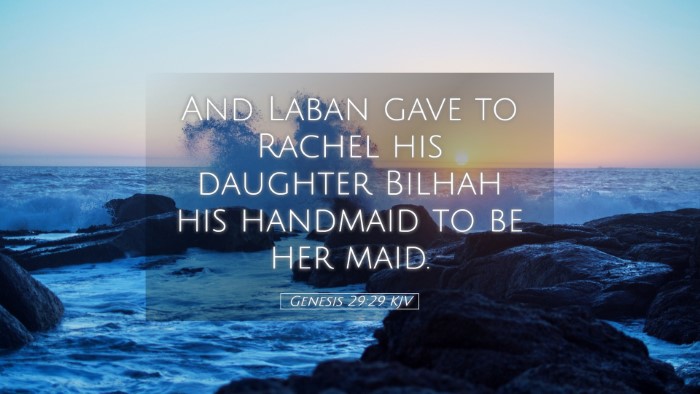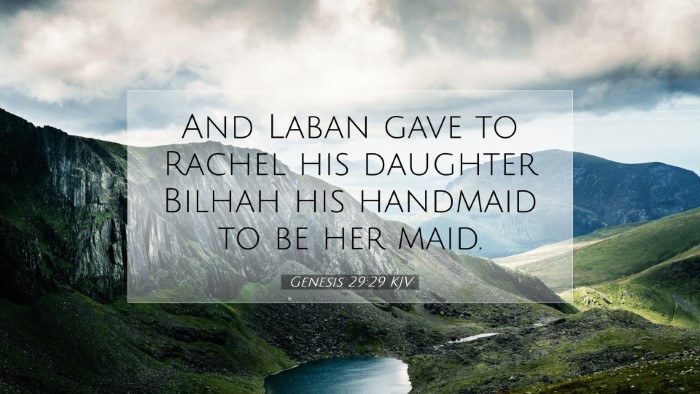Commentary on Genesis 29:29
Verse Context: Genesis 29:29 states, “And Laban gave to Rachel his daughter Bilhah his handmaid to be her maid.” This verse occurs in the narrative of Jacob’s complicated family dynamics, emphasizing themes of marriage, fidelity, and the nature of relationships.
Historical and Cultural Insights
Matthew Henry's Commentary: Henry notes that the practice of giving a handmaid to a wife was a custom of the times, paralleling the situations involving Sarah and Hagar, and later, Rachel and Leah. This reflects not only cultural norms regarding marriage but also the implications of rivalry and competition among sisters.
Albert Barnes Commentary: Barnes elaborates on the significance of Laban’s actions. The act of giving Bilhah to Rachel can be seen as Laban's strategic maneuvering within a patriarchal structure. Rachel's longing for children casts a shadow over her personal happiness; thus, Bilhah's introduction symbolizes both hope and tension within their family dynamics.
Theological Implications
Adam Clarke's Commentary: Clarke provides a theological interpretation of this verse, suggesting it signifies God's providential control over human relationships. The introduction of concubines into the biblical narrative raises questions about the divine design for marriage and monogamy versus the prevailing customs of the day.
Rivalry and Competition
- Emotional Context: The rivalry between Rachel and Leah serves as a backdrop to the social customs that influence their actions. Clarke emphasizes the emotional turmoil that accompanies a polygamous setting; Rachel's desperation for children drives her to accept Bilhah as a surrogate.
- Socio-Religious Norms: Henry points out that such practices were not uncommon, thus mirroring the socio-religious norms of that era. These norms highlight the complexities within familial relations, the hierarchy of wifely status, and the expectations placed on women.
Practical Applications for Ministry
For pastors, students, and theologians, Genesis 29:29 invites contemplation on the implications of cultural practices in spiritual life.
- Understanding Family Dynamics: The challenges faced by Jacob's family reflect modern issues in relationships. Counselors and ministers can draw parallels between biblical narratives and contemporary family struggles, such as jealousy and competition.
- Insights on Covenant Relationships: This verse prompts investigation into the covenant nature of relationships. Faithfulness and loyalty are core themes that can be addressed in preaching and teaching, emphasizing God's design for marriage and family.
- Grace Among Imperfect Persons: As seen in this story, even flawed characters are part of God’s plan. This offers hope to congregations navigating their imperfections, underscoring the necessity of grace in all relationships.
Conclusion
Genesis 29:29 serves as a pivotal moment in the biblical narrative that sets the stage for the complexities of Jacob's lineage. By weaving insights from the commentaries of Matthew Henry, Albert Barnes, and Adam Clarke, we see a multifaceted view of this verse—highlighting cultural practices, emotional struggles, and profound theological implications.
As scholars and ministers engage with this text, they are encouraged to explore its rich context and implications, ensuring that lessons derived from ancient texts resonate within contemporary settings. The interweaving of human experience with divine providence serves as a testament to God’s faithfulness, even amid human failure.


